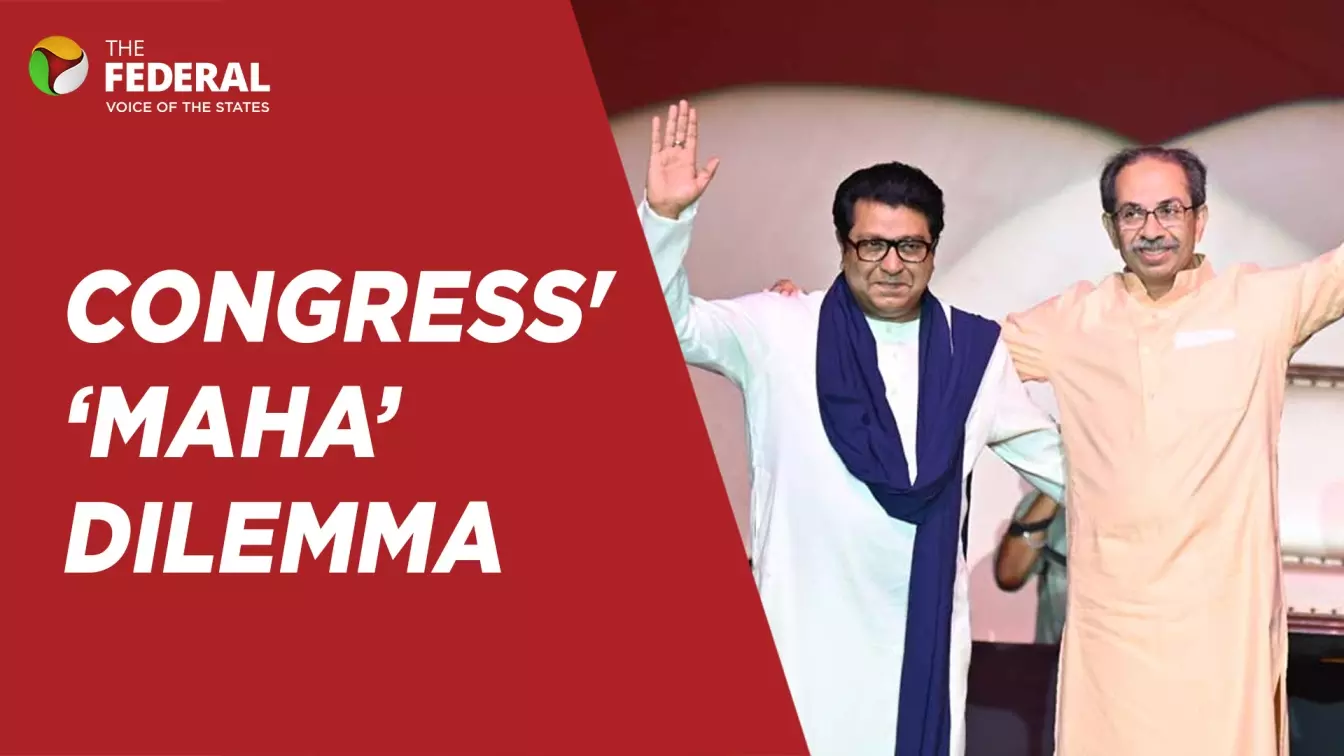
The conspicuous absence of the Congress party at the rally, despite an invite, has triggered speculation about cracks in the Maha Vikas Aghadi (MVA) alliance.
Why did Congress skip Thackeray cousins’ reunion?
As Uddhav and Raj Thackeray shared a stage, the Congress stayed away. Was it discomfort, strategy, or deeper alliance cracks?

Saturday's high-profile public reunion of Shiv Sena (UBT) chief Uddhav Thackeray and Maharashtra Navnirman Sena (MNS) president Raj Thackeray after two decades grabbed the headlines. But the conspicuous absence of the Congress party, despite an invite, has triggered speculation about cracks in the Maha Vikas Aghadi (MVA) alliance. In this interview with The Federal’s senior political correspondent Puneet Nicholas Yadav, we explore the deeper tensions, dilemmas, and the road ahead for the Congress in Maharashtra’s complex political landscape.
Why did the Congress stay away from the Thackeray reunion event?
The Congress was indeed invited, as were NCP leaders like Supriya Sule who attended. However, no one from the Congress - from the AICC, Maharashtra Congress, or Mumbai Regional Congress - was present. There are three reasons: discomfort with Raj’s divisive style, concern about alienating migrant voter blocs in Mumbai, and difficulty balancing regional and national narratives. The optics of sharing a stage with Raj, known for his past anti-migrant actions, would have clashed with the Congress’s pan-India pitch.
Also Read: Reunion of Thackerays has rattled Fadnavis, other Mahayuti leaders: Raut
Will Raj Thackeray’s return test the stability of the MVA alliance?
Yes, especially for the Congress. Ideologically, there are multiple issues on which the Congress and Shiv Sena don’t align - be it Hindutva or views on Savarkar. Raj’s aggressive positions on language and migrants only sharpen that divide. Congress has a national presence to consider, and balancing state-level emotive politics with national ideology will test the MVA's coherence.
Can the Congress maintain its national position while accommodating state-specific allies like the Sena?
That’s the core challenge. Congress prides itself on promoting inclusivity and federalism, unlike the BJP’s one-nation-one-language model. But as regional issues become increasingly emotive - like Hindi imposition or local language supremacy - it struggles to articulate a nuanced, unified stand. Silence is often the fallback, which doesn’t always work.
Also Read: ‘Maha’ reunion in Mumbai: Top 10 things Uddhav, Raj Thackeray said in their rally
How does the Congress navigate these conflicts in other states like Tamil Nadu or Karnataka?
It’s tricky. The DMK’s anti-Hindi stance, or Siddaramaiah’s Kannada-first policy, create friction with Congress’s Hindi belt base. Similar to Maharashtra, Congress avoids taking sides publicly, hoping to preserve support across linguistic regions. But this ambiguity is becoming harder to sustain.
Also Read: ‘We’ve come together to stay together’: Uddhav on reunion with Raj Thackeray
Will this balancing act affect Congress’s messaging in upcoming elections?
It already has. Their silence on several regional controversies shows the lack of a clear framework for managing such contradictions. With Raj Thackeray back in the Sena fold, the Congress will face more tough choices in Maharashtra - especially with civic elections and the Bihar Assembly polls approaching, where the migrant narrative could backfire.
(The content above has been generated using a fine-tuned AI model. To ensure accuracy, quality, and editorial integrity, we employ a Human-In-The-Loop (HITL) process. While AI assists in creating the initial draft, our experienced editorial team carefully reviews, edits, and refines the content before publication. At The Federal, we combine the efficiency of AI with the expertise of human editors to deliver reliable and insightful journalism.)

